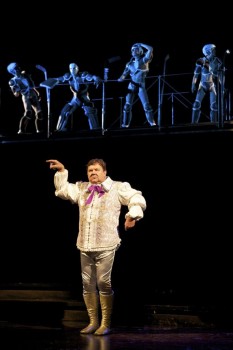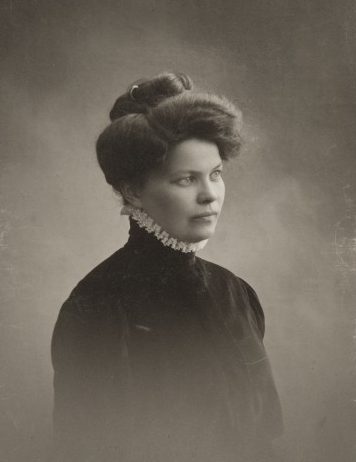Search results for "2010/05/song-without-words"
Mother-days
30 June 2006 | Fiction, poetry
Poems from Yhtä juhlaa (‘It’s all a big celebration’, WSOY, 2006)
(a square metre, 3.)
Now for the-kick-of-being-the-good-mum:
after the rye porridge
after the sons washed with camomile foam
and slipped into clean sheets
with mummy singing a sweet song.
Something about shadowed snow
and how at the blue twilit-moment one can
go inwards. If you’re up to looking. All that garbage and slag:
ash from the too-small days, clotted with
non-combustible blots, even though here
the sky’s clear
and the windows open to the winds.
Good grief, here we’re making new people.
But all I’d time for
was the track from the dishcloth to the nappy bin,
and back from the children’s painting-table
to the sink. No job
for spoilt girls, this: the prissiest minx
would soon turn woman in this fix:
kids coming next after next,
years of full-time labour
in a square metre where
you make no point about peccadilloes,
because so much is at stake.
You’re no longer a rose,
pimpinella, rosabella,
but subsoil: loam
and spots of unrottable compost.
A feebler person would have reversed on
the first tantrum;
the child’s learnt to say things
and is saying things
I never thought would come. More…
Poems, poèmes
30 June 1987 | Archives online, Fiction, poetry
Poems from Mies joka rakasti vaimoaan liikaa (‘The man who loved his wife too much’, 1979 and Vaikka on kesä (‘Although it’s summer’, 1983). Interview by Markku Huotari
Look at this epitaph with whiskers.
Threw herself so gladly into my troubles, sometimes she seemed to be bearing, properly, my burdens.
A dog called Julia. Combining
July and Yuletide.
Often thought of putting her down, so she wouldn’t need to die.
Smash her skull or break her neck
with my own hands, to stop her mourning her premature death.
Which still seems to be delaying.
She puts her four paws gently down, one at a time. So the Lord won’t hear her still about
and whisk her away.
Two years ago, she steps on some glass, her toe sticks out, a tendon’s cut.
She looks at me. Believe it or not,
I’m grieved by little Julia’s lot: for a second
I think the blood’s dripping from my own heart. More…
Elmo’s fire
30 June 2008 | Archives online, Fiction, Prose
Extracts from the novel Elmo (WSOY, 1978)
After returning to Finland and Kainalniemi, Elmo got to feel like a celebrity. The various sport clubs were insufferably keen on getting Elmo into their training rings, but Elmo rebuffed them. He had belonged to Kainalniemi Sweat since he was a little boy, and that was enough for him. His mind was occupied by other matters. In the end, even his mother and father began to wonder at his attitude.
‘Why don’t you just go, since they keep asking, and since you do seem to have some talent in that direction,’ his mother urged as she made Sunday coffee from the can Elmo had brought as a gift.
‘Right. Somewhere down the road you could snatch a few gold medals out from under the noses of the others, just for the hell of it,’ his father said. More…
Art or politics?
16 February 2012 | This 'n' that
You’re going about your business in Helsinki Railway Station on a cold winter’s day — waiting for your train, buying tickets or newspapers or just taking short-cut through the building to keep warm – when suddenly the bloke next to you bursts into song. And not just him: along with a couple of dozen others, he makes the air ring with the patriotic song Finlandia, sung in harmony and perfectly in tune. (The video can be viewed at http://www.youtube.com/watch?v=wO63xt2jWtc) More…
In pursuit of a conscience
19 March 2012 | Drama, Fiction
‘An unflinching opera and a hot-blooded cantata about a time when the church was torn apart, Finland was divided and gays stopped being biddable’: this is how Pirkko Saisio’s new play HOMO! (music composed by Jussi Tuurna) is described by the Finnish National Theatre, where it is currently playing to full houses. This tragicomical-farcical satire takes up serious issues with gusto. In this extract we meet Veijo Teräs, troubled by his dreams of Snow White, who resembles his steely MP wife Hellevi – and seven dwarves. Introduction by Soila Lehtonen

Dictators and bishops: Scene 15, ‘A small international gay opera’. Photographs: The Finnish National Theatre / Laura Malmivaara, 2011
CAST OF CHARACTERS
Veijo Teräs
Hellevi, Veijo’s wife and a Member of Parliament
Hellevi’s Conscience
Rebekka, Hellevi and Veijo’s daughter
Moritz, Hellevi and Veijo’s godson
Agnes af Starck-Hare, Doctor of Psychiatry
Seven Dwarves
Tom of Finland
Atik
The Bishop of Mikkeli
Adolf Hitler
Albert Speer
Josef Stalin
Old gays: Kale, Jorma, Rekku, Risto
Olli, Uffe,Tiina, Jorma: people from SETA [the Finnish LGBT association]
Second Lieutenant, Private Teräs, the men in the company
A Policeman
Big Gay, Little Gay, Middle Gay
William Shakespeare
Hermann Göring
Hans-Christian Andersen
Teemu & Oskari, a gay couple
The Apostle Paul
Father Nitro
Winston Churchill
SCENE ONE
On the stage, a narrow closet.
Veijo Teräs appears, struggling to get out of the closet.
Veijo Teräs is dressed as a prince. He is surprised and embarrassed to see that the audience is already there. He seems to be waiting for something.
He speaks, but continues to look out over the audience expectantly.

Snow White's spouse, Veijo (Juha Muje), and the dwarves. Photo: Laura Malmivaara, 2011
VEIJO
This outfit isn’t specifically for me, because… I mean, it’s part of this whole thing. This Snow White thing. I’m waiting for the play to start. Just like you are. My name is Veijo Teräs and I’m playing the point of view role in this story. Writers put point of view roles like this in their plays nowadays. They didn’t use to.
Just to be clear – this isn’t a ballet costume. I’m not going to do any ballet dancing, but I won’t mind if someone dances, even if it’s a man. Particularly if it’s a man. But I don’t watch. Ballet, I mean. Not at the opera house, or on television, or anywhere, and I have no idea why we had to bring up ballet – or I had to bring it up – because this is a historical costume, so it’s appropriate. This is what men used to wear, real men like Romeo and Hamlet, or Cyrano de Bergerac. But we in the theatre these days have a hell of a job getting an audience to listen to what a man has to say when he’s standing there saying what he has to say in an outfit like this. People get the idea that it’s a humorous thing, but this isn’t, this Snow White thing, where I play the prince. Snow White is waiting in her glass casket, she died from an apple, which seems to have become the Apple logo, Lord knows why, the one on the laptops you see on the tables of every café in town. More…
A happy day
12 August 2010 | Fiction, Prose
‘Muttisen onni eli laulu Lyygialle’ (‘Muttinen’s happiness, or a song for Lygia’‚) a short story from Kuolleet omenapuut (‘Dead apple trees’, Otava, 1918)
‘Quite the country gentleman, eh, what, hey?’ says Aapeli Muttinen the bookseller. ‘Like the poet Horace – if I may humbly make the comparison, eh, dash it? With his villa at Tusculum, or whatever the place was called, given to him by Maecenas, in the Sabine hills, wasn’t it? – dashed if I remember. Anyway, he served Maecenas, and I serve – the public, don’t I? Selling them books at fifty pence a copy.’
Muttinen’s Tusculum is his little plot of land in the country. A delightful place, comforting to contemplate when the first signs of summer are beginning to appear, after a winter spent in town in the busy pursuit of Mammon, under skies so grey that the wrinkles on Muttinen’s forehead must have doubled in number. A summer paradise of idleness… More…
Between covers
31 December 1990 | Archives online, Children's books, Fiction
Extracts from Lastenkirja (‘Children’s book’, WSOY, 1990, illustrated by the Estonian animator and graphic artist Priit Pärn)
CHILDREN’S BOOK IS BORN
Children are wafting around the world: they come spilling out of the chimneys and clattering out of the pipes. They worm around cramped places in the nether regions, rise up through stiff roots into the treetops and muss up the clouds. Children just happen anywhere and bring the Adults along with them. More…
The path-walker
A short story from Sisustus (‘Interior decoration’, Tammi, 2000)
I do not know where I came from. Suddenly, I was just there. I stood on my feet. They support me. I look out of my eyes. I do not see them.
Sounds arrive in my ears. Moment by moment, I distinguish them better. I see the landscape through which I am walking. I distinguish the trees from each other. The path runs between them, and I stare at them, as if staring into a twilight that, when you look more closely, splits into trees, bushes, birds. I feel the roots through the soles of my shoes. I feel the softness of the moss, the pine-cones and the little stones. More…
Arska
30 September 1982 | Archives online, Fiction, Prose
A short story from Kaksin (‘Two together’). Introduction by Pekka Tarkka
A landlady is a landlady, and cannot be expected – particularly if she is a widow and by now a rather battered one – to possess an inexhaustible supply of human kindness. Thus when Irja’s landlady went to the little room behind the kitchen at nine o’clock on a warm September morning, and found her tenant still asleep under a mound of bedclothes, she uttered a groan of exasperation.
“What you do here this hour of day?” she asked, in a despairing tone. “You don’t going to work?”
Irja heaved and clawed at the blankets until at last her head emerged from under them.
“No,” she replied, after the landlady had repeated the question.
“You gone and left your job again?”
“Yep.” More…

